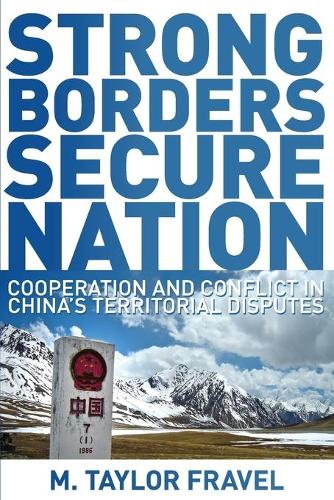
Strong Borders, Secure Nation: Cooperation and Conflict in China's Territorial Disputes
(Paperback)
Publishing Details
Strong Borders, Secure Nation: Cooperation and Conflict in China's Territorial Disputes
By (Author) M. Taylor Fravel
Princeton University Press
Princeton University Press
24th November 2008
United States
Classifications
Tertiary Education
Non Fiction
Warfare and defence
Asian history
327.51
Physical Properties
Paperback
408
Width 152mm, Height 235mm
595g
Description
As China emerges as an international economic and military power, the world waits to see how the nation will assert itself globally. Yet, as M. Taylor Fravel shows in Strong Borders, Secure Nation, concerns that China might be prone to violent conflict over territory are overstated. The first comprehensive study of China's territorial disputes, Strong Borders, Secure Nation contends that China over the past sixty years has been more likely to compromise in these conflicts with its Asian neighbors and less likely to use force than many scholars or analysts might expect. By developing theories of cooperation and escalation in territorial disputes, Fravel explains China's willingness to either compromise or use force. When faced with internal threats to regime security, especially ethnic rebellion, China has been willing to offer concessions in exchange for assistance that strengthens the state's control over its territory and people. By contrast, China has used force to halt or reverse decline in its bargaining power in disputes with its militarily most powerful neighbors or in disputes where it has controlled none of the land being contested. Drawing on a rich array of previously unexamined Chinese language sources, Strong Borders, Secure Nation offers a compelling account of China's foreign policy on one of the most volatile issues in international relations.
Reviews
"Fravel's is an elegant argument that works well to explain Chinese behavior and holds promise for application elsewhere."--Andrew J. Nathan, Foreign Affairs "This comprehensive, compelling volume by Fravel seeks to address the overstated concerns that China might be prone to violent conflict over territory."--S.K. Ma, Choice "M. Taylor Fravel ... provides compelling evidence that in its territorial disputes China has been less prone to violence and more cooperative than realist theory or conventional wisdom about an expansionist state might suggest."--David Rosenberg, China Journal "This is a tour de force work of scholarship that is comprehensive, empirically rich and analytically strong... For anyone who works on contemporary China, this book will be an indispensible reference volume."--Andrew Scobell, Pacific Affairs "The book is not only a necessary work for everyone dealing with Chinese politics, but also it deserves to become a new standard for the study of international politics in general."--Bart Dessein, International History Review "[T]his book is an unqualified welcome addition to the still comparatively sparse academic literature on China's territorial disputes and security perceptions."--Chien-Peng Chung, Contemporary Southeast Asia "Fravel offers an important interpretation of China's behaviour, based on what it has actually done in the last six decades... The book will help many trying to decide whether China will be a disruptive or a positive international force in the years to come."--Kerry Brown, Asian Affairs "This book makes a refreshing change, both for its theoretical and empirical rigour and in its balanced coverage."--Jonathan Sullivan, Political Studies Review "How China handles the issue of Taiwan is going to offer a significantly novel framework for international studies over territorial sovereignty disputes. Fravel has provided a plethora of historical details and sophisticated explanations for these diplomatic events, and has produced a highly readable book."--Yuk Wah Chan, Journal of Chinese Political Science "Professor M. Taylor Fravel ... has made a valuable contribution to Princeton Studies in International History and Politics... His impeccable research helps in correcting false notions, for instance, on China's boundary agreement with Pakistan on March 2, 1963."--A. G. Noorani, Frontline
Author Bio
M. Taylor Fravel is associate professor of political science and member of the Security Studies Program at the Massachusetts Institute of Technology.
